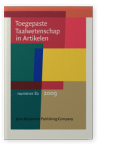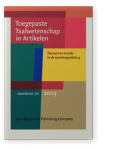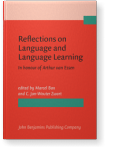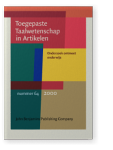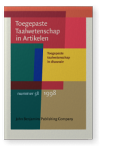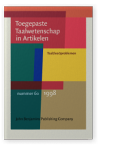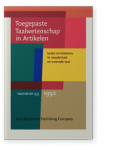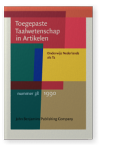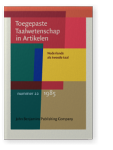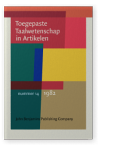Hilde Hacquebord
List of John Benjamins publications for which Hilde Hacquebord plays a role.
2009 Doorlopende Leerlijnen Taalonderwijs Nederlands: Theorie en Praktijk Toegepaste Taalwetenschap in Artikelen 82, pp. 21–29 | Article
In 2008 the Dutch government has introduced a Framework of Reference (called 'Doorlopende leerlijnen'; English 'Curricular continuity policy') that will be guiding for future development of educational materials and for test development in LI and L2. The Dutch framework is more or less linked to… read more
2003 Tekstbegrip Van Wiskundetaken: Een Moeilijke Opgave? Thema's en trends in de sociolinguistiek 4, pp. 91–101 | Article
In secondary education, mathematics education has been highly influenced by Realistic Mathematics, which means that mathematical problems are presented in rich linguistic contexts. In order to solve the mathematical problem, students have to make a correct representation of the problem, and this… read more
2001 16. Content-based language teaching: Language in the mathematics classroom Reflections on Language and Language Learning: In honour of Arthur van Essen, Bax, Marcel and Jan-Wouter Zwart (eds.), pp. 221–236 | Chapter
2000 De Moeilijkheidsgraad van Schoolboektektsen als Grondslag Voor het Vaststellen van Tekstbegripvaardigheid Onderzoek ontmoet onderwijs, pp. 83–94 | Article
The assessment of text difficulty has played an important role in the development of the 'Elektronische tekstbegriptoets voor de brugklas', a tool for screening students in the first year of secondary education on their text comprehension skills. On the one hand, the investigation was intended to… read more
1998 Samenwerkend Woorden Leren Als Vorm Van Content Based Language Learning; Een Succesvolle Aanpak? Toegepaste taalwetenschap in discussie, pp. 63–69 | Article
Second-language learners need a vocabulary course that they can apply in content areas. Although many schools opt for a reading curriculum to support weak readers, many L2-readers still have difficulties at the word level. In the reading course Weet wat je Leest (Know what you are reading'), there… read more
1998 Taalhulp op Maat: Verwijzing en Differentiatie in de Brugklas Taal(leer)problemen, pp. 19–28 | Article
This article des ribes the implementation of a screening test of text comprehension in five secondary schools. The test results yield diagnostic information about the individual's reading style, which may be either compensating for a lack of word knowledge, or a 'bottom-up' reading style without… read more
1998 Reactie op 'Modellen en Metingen Van Taalvaardigheid' Toegepaste taalwetenschap in discussie, pp. 179–180 | Article
1992 Vakteksten Lezen In Nt2 Een Verkennend Onderzoek Lezen en luisteren in moedertaal en vreemde taal, pp. 78–89 | Article
In the Netherlands, as well as in other Western European countries, many minority children are unsuccesful in their school careers. Their lack of achievement is, among other things, due to a language problem which is most probably related to literacy. In vocational education they are faced with the… read more
1990 NT2-Lesmaterialen voor het Voortgezet Onderwijs: Een Overzicht Onderwijs Nederlands als T2: De stand van zaken, pp. 98–108 | Article
1985 Taalgebruik in Schoolboeken en Anderstaligen in het Voortgezet Onderwijs Nederlands als tweede taal, pp. 86–93 | Article
Young immigrant adults may have difficulties in schools because of a lack of literate skills in the second language, viz. Dutch. If they are confronted with texts that are too difficult for them they may stagnate in their (literate) language development and even drop out of school. Teachers with… read more
1982 Turkse en Nederlandse Leesvaardigheid van Twee Groepen Turkse Leerlingen in het Voortgezet Onderwijs. Toegepaste Taalwetenschap in Artikelen 14, pp. 83–96 | Article
Pupils of foreign origin need proficiency in both oral and literate skills to succeed in the Dutch secondary school system. In this article the development of literate skills in L-1 and L-2 is examined. The way in which a second language is learned is influenced by the level and type of mother… read more
